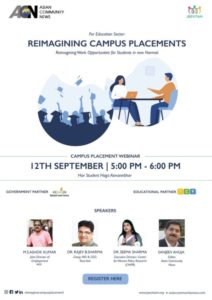More than a thousand college students, job seekers from across India join “Reimagining Campus Placement” webinar
During this mega online event, the experts addressed questions like how should college students equip themselves for higher studies, what kind of skilling is needed for the new avenues of livelihood, and What should a student prepare before graduating to become an entrepreneur.
NEW DELHI: More a thousand college students and entry-level job-seekers across India participated in the “Reimagining Campus Placement” webinar held online on September 12.
Streamed live on video-conferencing app Zoom, and other IT-driven means like Facebook Live and Audio Conferencing, the event that evoked nation-wide response and won accolades was the third in the series of webinars that offered on-the-spot solutions to the college/university students and other youths looking for entry-level employment opportunities.
The experts who offered solutions and addressed the queries of the participants included M.S. Ashok Kumar, Joint Director (Employment), National Institute of Career Services (NICS), a venture of the Ministry of Labour & Employment in Noida; Dr. Rajev B Sharma, Group MD & CEO of TASA Global Group; and Dr. Seema Sharma, Executive Director, Center for Women Policy Research (CWPS) and Founder advait.world.
Jeevitam – a tech-enabled livelihood platform in association with Asian Community News (ACN) Network organized the webinar with the support of the National Institute of Career Services (NICS).
The event was co-hosted by KG Mohan, Independent Consultant, and Munish Chawla, Co-Founder of Jeevitam.
While quoting the National Policy of Skill Development and Entrepreneurship document, M S Ashok Kumar, Joint Director, NICS said that about 4.69 million youth population in India was trained on skills in the age group of 20-24 years.
“In deep contrast, every year 26.4 million youths join the workforce and it’s a huge demand and supply gap. Many government departments have launched many programmes to address this issue, and NICS is one of these initiatives for the rescue of the job seekers, as well as counselors and educationists,” Kumar added.
Kumar offered various means and ways to the participating youths to become employable and find jobs such as the use of the NICS portal www.ncs.gov.in, and explained about various schemes and using the portal.
Dr. Rajev B Sharma, Group MD & CEO of TASA Global Group that includes ventures like Tasa Asia, Tasa Study Abroad, Workkfromhome.com, Karreerpath, and TasaVarsity, explained about the possibilities of studying and working abroad.
As an Education Entrepreneur, a seasoned leader and a technocrat, Dr. Sharma comes with extensive 27 years of global business experience in Education, Training, and Finance.
He said that those undergraduate students who were planning to studying and working abroad could start online and those who were postgraduate students could do this in January since the visas and international borders are closed for now because of the COVID-19 pandemic.
 “There is a new concept of ‘Vocations Abroad’ that we offer to the aspiring students in the niche areas such as hospitality, paramedics – nurses, technicians, IT hardware related areas, automobiles. Students should prepare a lot before going abroad, where institutions look for 9-13 specialty areas. If going for higher studies, students need to become employable, and look for four things – what are they passionate about, what skills, what they need to be paid for, and what the world is looking at. There are techniques such as brain mapping in establishing the career goals and build CVs,” said Dr. Rajev B Sharma.
“There is a new concept of ‘Vocations Abroad’ that we offer to the aspiring students in the niche areas such as hospitality, paramedics – nurses, technicians, IT hardware related areas, automobiles. Students should prepare a lot before going abroad, where institutions look for 9-13 specialty areas. If going for higher studies, students need to become employable, and look for four things – what are they passionate about, what skills, what they need to be paid for, and what the world is looking at. There are techniques such as brain mapping in establishing the career goals and build CVs,” said Dr. Rajev B Sharma.
Dr. Sharma asked the students to find their own Ikigai – a Japanese concept which means “a reason for being”. It refers to having a direction or purpose in life, that which makes one’s life worthwhile, and towards which an individual takes spontaneous and willing actions giving them satisfaction and a sense of meaning to life.
In her address, Dr Seema Sharma, Executive Director, Center for Women Policy Research (CWPS) said that the average families in India could not think of going abroad and finding employment there.
“India is not promulgating the idea of Atmanirbhar – the self-reliance in every field including employment and industry. In developed countries, youths work and contribute to the economy but in developing countries like India, they are kind of burden on their families because of the kind of education system they are perusing. National Education Policy 2020 is excellent but how the state governments are going to implement is something to see. There is a huge disconnection between the education and need for employment,” Dr. Seema Sharma added.
She said the student can explore immense opportunities in the field of neighborhood jobs such as environment, sustainability, etc. The students are studying these subjects in their colleges and later implement their studies in real-time situations, and they can also launch start-ups. Students much think of opportunities beyond becoming routine doctors, and engineers.



